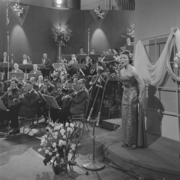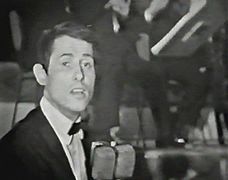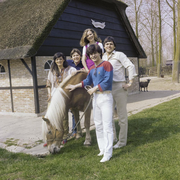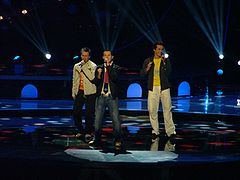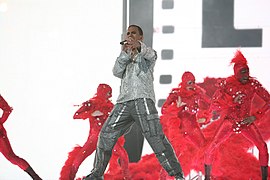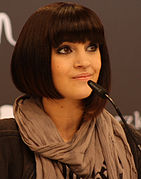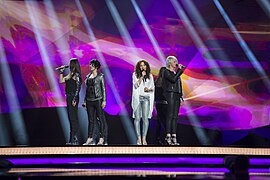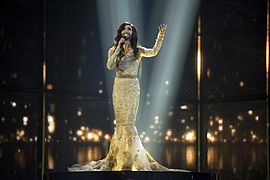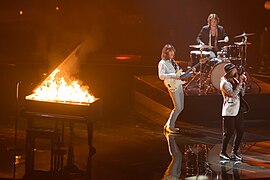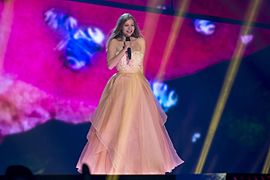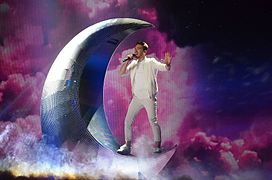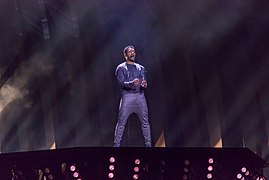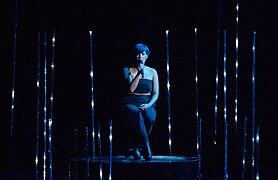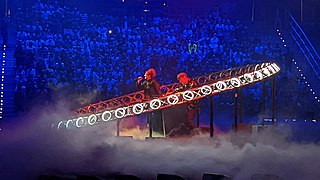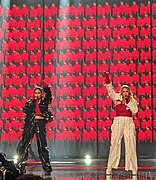Austria in the Eurovision Song Contest
| Austria in the Eurovision Song Contest | |
|---|---|

| |
| Participating broadcaster | Österreichischer Rundfunk (ORF) |
| Participation summary | |
| Appearances | 56 (49 finals) |
| First appearance | 1957 |
| Highest placement | 1st: 1966, 2014 |
| Host | 1967, 2015 |
| External links | |
| Austria's page at Eurovision.tv | |
Austria in the Eurovision Song Contest 2024 | |
Austria has participated in the Eurovision Song Contest 56 times since its debut in 1957. The country has won twice, in 1966 and 2014, and such it holds the record for the longest gap between consecutive wins — 48 years. The Austrian participant broadcaster in the contest is Österreichischer Rundfunk (ORF). Vienna was the host city on both of the occasions that the contest was held in Austria, in 1967 and 2015.
Having finished sixth at the 1964 contest and fourth in 1965, Udo Jürgens won at his third attempt in 1966 with the song "Merci, Chérie". This was Austria's only top three result of the 20th century. Austria won again in 2014, with "Rise Like a Phoenix" by Conchita Wurst. Austria has finished last in the contest final seven times (1957, 1961, 1962, 1979, 1984, 1988, and 1991) and finished last in the semi-final in 2012. "Nobody but You" by Cesár Sampson achieved Austria's eighth top five result and second-best result of the 21st century at the 2018 contest, finishing third.
History
[edit]Österreichischer Rundfunk (ORF) is a full member of the European Broadcasting Union (EBU), thus eligible to participate in the Eurovision Song Contest representing Austria.
ORF finished last at its debut in the contest in 1957, before Liane Augustin gave the country the first of its eight top five results in 1958, with fifth. Having finished sixth in 1964 and fourth in 1965, Udo Jürgens won the contest at his third attempt in 1966. This would be Austria's only top three result of 20th century. The country's best result over the next 46 years (1967–2013) would be fifth place, which it achieved with The Milestones in 1972, Waterloo and Robinson in 1976 and Thomas Forstner in 1989. Austria has finished last in the final a total of seven times, in 1957, 1961, 1962, 1979, 1984, 1988, 1991. The country also finished last in the semi-final in 2012. Austria's best result of the 1990s was four tenth-place finishes, in 1990, 1992, 1996 and 1999. Austria's best result of the 2000s was Alf Poier's sixth-place in 2003, which was Austria's best placement since 1989.
After a three-year absence, ORF announced on 28 July 2010 that Austria would return to the contest in 2011,[1][2] where the country reached the final for the first time since 2004, finishing 18th.[citation needed]
Austria achieved its second victory in the contest at the 2014 contest, with Conchita Wurst winning with 290 points.[3] In a complete reversal of fortunes in 2015, following a tie-break rule Austria was placed 26th and scored nul points along with Germany (27th), they became the first countries since the United Kingdom in 2003 to score nul points at the final. Because of this, Austria became the first host country to receive nul points. Austria qualified for the final for the next three years, finishing 13th in 2016, 16th in 2017 and in 2018, when "Nobody but You" by Cesár Sampson finished third. The country's fortunes were once again reversed afterwards, with Paenda (2019), Vincent Bueno (2021) and Lumix feat. Pia Maria (2022) all failing to qualify. Teya and Salena returned Austria to the final in 2023, finishing 15th.
Absences
[edit]Austria has opted out of participation in several contests. The first of these was the 1969 contest, which was staged in Madrid. As Spain was ruled at that time by Francisco Franco, Austria chose to boycott the contest. Contest historian John Kennedy O'Connor points out, however, that Austria had given Spain two points in the previous event and since Spain only won by one point, the political protest was seen as disingenuous.[4]
The following year, Austria was again absent. This was due to the unprecedented result in 1969 in which four songs tied for first place, a result which prompted several other countries to opt out as well.[4]
From 1973 to 1975, Austria stayed away as well. The exact reason for this is unclear, however the scoring system in use at one of these contests, which allowed all entrants a guaranteed number of points, may have been a factor.
The country was ineligible to compete in 1998 and 2001, as it had not achieved sufficiently high placings in the five previous years.[4]
Prior to the 2006 contest, Austria announced that it would not enter a performer in protest at their poor results in previous years, arguing that the musical talent of the performers was no longer the determining factor in success at the event.[5][6] The country returned for the 2007 contest in Helsinki, but came second to last in the semi-final. National broadcaster ORF cited the 2007 result, as well as declining interest in the contest among Austrian viewers, as the reason Austria would not return to the contest in 2008. ORF programme director Wolfgang Lorenz also hinted that Austria may withdraw from the contest indefinitely, stating "ORF has no desire to send more talent out of Austria to a competition where they have no chances...Should the situation change, we'll be happy to take part again".[7] Despite withdrawing, the final of the 2008 contest was shown on ORF.[8]
In 2008, the EBU introduced two semi-finals to the contest, hoping that spreading countries out by random draw would prevent the kind of bloc voting that had warded Austria off. Additionally, juries were reintroduced to determine 50% of each country's result in 2009 (albeit not in the semi-finals, in which all but one of the qualifiers were decided entirely by televote). However, Edgar Böhm, director of entertainment for ORF, said that the semi-final format "still incorporates a mix of countries who will be politically favoured in the voting process" and "that, unless a clear guideline as to how the semifinals are organised is made by the EBU, Austria will not be taking part in Moscow 2009".[9] ORF decided not to participate in the 2009 contest, but did broadcast the final as in 2008.[10] The EBU announced that they would work harder to bring Austria back to the contest in 2010, along with former participants Monaco and Italy.[11] It was, however, confirmed that Austria would not participate in the 2010 contest in Oslo.[12] In July 2010, the chairman of ORF, Alexander Wrabetz, stated that Austria would return for the 2011 contest, due to it being held in its neighbour Germany.[1][2][13] In 2011, Austria reached the final for the first time since 2004.
Participation overview
[edit]| 1 | First place |
| 2 | Second place |
| 3 | Third place |
| ◁ | Last place |
| X | Entry selected but did not compete |
| † | Upcoming event |
Hostings
[edit]| Year | Location | Venue | Presenter | Photo |
|---|---|---|---|---|
| 1967 | Vienna | Großer Festsaal der Wiener Hofburg | Erica Vaal | |
| 2015 | Wiener Stadthalle | Mirjam Weichselbraun, Alice Tumler, Arabella Kiesbauer and Conchita Wurst | 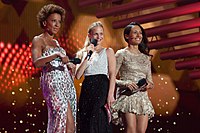
|
Awards
[edit]Marcel Bezençon Awards
[edit]| Year | Category | Song | Performer(s) | Composer(s) | Host city | Ref. |
|---|---|---|---|---|---|---|
| 2014 | Press Award | "Rise Like a Phoenix" | Conchita Wurst | Charley Mason, Joey Patulka, Ali Zuckowski, Julian Maas |
Related involvement
[edit]Conductors
[edit]| Year | Conductor[g] | Musical Director | Notes | Ref. |
|---|---|---|---|---|
| 1957 | Carl de Groof | N/A | [16] | |
| 1958 | Willy Fantel | |||
| 1959 | [h] | |||
| 1960 | Robert Stolz | |||
| 1961 | [i] | |||
| 1962 | Bruno Uher | |||
| 1963 | Erwin Halletz | |||
| 1964 | Johannes Fehring | |||
| 1965 | [j] | |||
| 1966 | Hans Hammerschmid | |||
| 1967 | Johannes Fehring | |||
| 1968 | Robert Opratko | N/A | ||
| 1971 | [17] | |||
| 1972 | Erich Kleinschuster | |||
| 1976 | ||||
| 1977 | Christian Kolonovits | |||
| 1978 | Richard Oesterreicher | |||
| 1979 | ||||
| 1980 | [18] | |||
| 1981 | ||||
| 1982 | ||||
| 1983 | ||||
| 1984 | ||||
| 1985 | ||||
| 1986 | ||||
| 1987 | ||||
| 1988 | Harald Neuwirth | |||
| 1989 | No conductor | |||
| 1990 | Richard Oesterreicher | |||
| 1991 | ||||
| 1992 | Leon Ives | |||
| 1993 | Christian Kolonovits | |||
| 1994 | ||||
| 1995 | Michael F. Kienzl | |||
| 1996 | Mischa W. Krausz | |||
| 1997 | No conductor | |||
Heads of delegation
[edit]| Year | Head of delegation | Refs. |
|---|---|---|
| 2019–2024 | Stefan Zechner |
Commentators and spokespersons
[edit]Between the 1970 and 1998 contests, every contest was commentated by Austrian radio journalist and actor Ernst Grissemann, with the exception of the 1979 and 1990 contests. Grissemann admitted to future German commentator Peter Urban in 1995 that he only stayed for the dress rehearsal and then provided the Austrian commentary live from the ORF studios.[21] After 1998 Grissemann stepped down from the commentary and was replaced by Andi Knoll. Austria has also broadcast the contests which it did not compete in, except for the 2010 contest.
Photo gallery
[edit]See also
[edit]- Austria in Eurovision Choir – A competition organised by the EBU for non-professional choirs.
- Austria in the Eurovision Dance Contest – Dance version of the Eurovision Song Contest.
- Austria in the Eurovision Young Dancers – A competition organised by the EBU for younger dancers aged between 16 and 21.
- Austria in the Eurovision Young Musicians – A competition organised by the EBU for musicians aged 18 years and younger.
Notes and references
[edit]Notes
[edit]- ^ Specifically Viennese German
- ^ Specifically Vorarlbergisch, a High Alemannic dialect
- ^ Specifically Styrian, a Southern Bavarian dialect
- ^ According to the then-Eurovision rules, the top ten non-Big Four countries from the previous year along with the Big Four automatically qualified for the Grand Final without having to compete in semi-finals. For example, if Germany and France placed inside the top ten, the 11th and 12th spots were advanced to next year's Grand Final along with all countries ranked in the top ten.
- ^ Specifically Mühlviertlerisch, a Central Bavarian dialect spoken in Upper Austria
- ^ The 2020 contest was cancelled due to the COVID-19 pandemic.
- ^ All conductors are of Austrian nationality unless otherwise noted.
- ^ Host conductor
- ^ Host conductor
- ^ Host conductor
References
[edit]- ^ a b Klier, Marcus (27 July 2010). "Austria will return to Eurovision in 2011". ESCToday. Retrieved 27 July 2010.
- ^ a b "Song Contest: Österreich tritt 2011 wieder an" (in German). ORF. 27 July 2010. Retrieved 27 July 2010.
- ^ "Austria wins Eurovision Song Contest". BBC News. 11 May 2014. Retrieved 11 May 2014.
- ^ a b c O'Connor, John Kennedy (2005). The Eurovision Song Contest: The Official History.
- ^ Philips, Roel (18 June 2005). "Austria withdraws from 2006 Eurovision Song Contest". Retrieved 10 December 2006.
- ^ Philips, Roel (20 June 2005). "Austrian Broadcaster explains withdrawal". Retrieved 12 December 2006.
- ^ Holyer, Steve (20 November 2007). "Austria will not go to Belgrade". Retrieved 20 November 2007.
- ^ Klier, Marcus (2 January 2008). "ORF likely to broadcast Eurovision Song Contest 2008". Retrieved 1 March 2008.
- ^ Kuipers, Michael (3 June 2008). "Austria: ORF will decide in the Autumn". ESCToday. Retrieved 3 June 2008.
- ^ Klier, Marcus (18 September 2008). "Austria: No return to Eurovision in 2009". ESCToday. Retrieved 18 September 2008.
- ^ Floras, Stella (13 January 2009). "EBU working for Eurovision full house in 2010". ESCToday. Retrieved 30 July 2009.
- ^ Klier, Marcus (22 September 2009). "Confirmed: Austria will not take part in 2010". ESCToday. Retrieved 21 September 2016.
- ^ Wrabetz, Alexander (31 May 2010). "Wrabetz will ORF-Antreten "sicher überdenken"". derstandard.at (in German). Archived from the original on 5 June 2010. Retrieved 1 June 2010.
- ^ Jiandani, Sanjay (7 September 2024). "Austria confirms participation at Eurovision 2025". ESCToday. Retrieved 7 September 2024.
- ^ "Winners of the Marcel Bezençon Awards". eurovision.tv. 11 May 2014. Retrieved 8 December 2019.
- ^ Roxburgh, Gordon (2012). Songs for Europe: The United Kingdom at the Eurovision Song Contest. Vol. One: The 1950s and 1960s. Prestatyn: Telos Publishing. pp. 93–101. ISBN 978-1-84583-065-6.
- ^ Roxburgh, Gordon (2014). Songs for Europe: The United Kingdom at the Eurovision Song Contest. Vol. Two: The 1970s. Prestatyn: Telos Publishing. pp. 142–168. ISBN 978-1-84583-093-9.
- ^ Roxburgh, Gordon (2016). Songs for Europe: The United Kingdom at the Eurovision Song Contest. Vol. Three: The 1980s. Prestatyn: Telos Publishing. ISBN 978-1-84583-118-9.
- ^ McCaig, Ewan (24 April 2019). "Austria: Vienna Hosts Eurovision Farewell Party For PÆNDA". Eurovoix. Retrieved 6 December 2019.
- ^ Conte, Davide (24 April 2024). "Austria: Farewell Party for Kaleen Held in Vienna". Eurovoix. Retrieved 24 April 2024.
- ^ "Begegnung in der Box | Das Erste: Eurovision Song Contest - News - Mein Grand Prix". Eurovision.de. 14 May 2011. Retrieved 14 May 2014.
- ^ "Radioprogramme" [Radio programs]. Wiener Zeitung (in German). Vienna, Austria. 24 May 1956. p. 8. OCLC 1371238305.
- ^ "Sieben Tage Fernsehen" [Seven days of television]. Bild+Funk (Ausgabe B) (in German). No. 10/1957. 3 March 1957. p. 15. OCLC 643528928.
- ^ "Fernsehprogramm vom 8. bis 14. März 1959" [Television schedule from 8 to 14 March 1959]. Burgenländische Freiheit (in German). Wiener Neustadt, Austria. 7–8 March 1959. p. 9. Retrieved 23 June 2024 – via Austrian National Library.
- ^ "Radio program | Televizijski program" [Radio schedule | Television schedule]. Slovenski vestnik (in Slovenian). Klagenfurt, Austria. 25 March 1960. p. 7. Retrieved 21 May 2024 – via Digital Library of Slovenia.
- ^ "Fernsehprogramm vom 12. bis 18. März 1961" [Television schedule from 12 to 18 March 1961]. Burgenländische Freiheit (in German). Eisenstadt, Austria. 11 March 1961. p. 12. Retrieved 25 June 2024 – via Austrian National Library.
- ^ "Fernsehprogramm vom 18. bis 24. März 1962" [Television schedule from 18 to 24 March 1962]. Burgenländische Freiheit (in German). Wiener Neustadt, Austria. 17 March 1962. p. 12. Retrieved 23 June 2024 – via Austrian National Library.
- ^ "Fernsehprogramm – Vom 17. bis 23. März 1963 – Samstag, den 23. März" [Television schedule – From 17 to 23 March 1963 – Saturday, 23 March]. Burgenländische Freiheit (in German). Wiener Neustadt, Austria. 16 March 1963. p. 10. Retrieved 23 June 2024 – via Austrian National Library.
- ^ Roxburgh, Gordon (2012). Songs for Europe: The United Kingdom at the Eurovision Song Contest. Volume One: The 1950s and 1960s. Prestatyn: Telos Publishing. pp. 291–299. ISBN 978-1-84583-065-6.
- ^ "Fernsehprogramm" [Television schedule]. Burgenländische Freiheit (in German). Wiener Neustadt, Austria. 15 March 1964. p. 11. Retrieved 14 July 2024 – via Austrian National Library.
- ^ "Fernsehprogramm" [Television schedule]. Burgenländische Freiheit (in German). Wiener Neustadt, Austria. 13 March 1965. p. 9. Retrieved 14 July 2024 – via Austrian National Library.
- ^ "Fernsehprogramm – Samstag, 5. März" [Television program – Saturday, 5 March]. Burgenländische Freiheit (in German). Wiener Neustadt, Austria. 26 February 1966. p. 8. Retrieved 14 July 2024 – via Austrian National Library.
- ^ L'Eurovision (in French). Institut national de l'audiovisuel (INA). 12 March 1966. Retrieved 20 November 2024.
Hans-Joachim Rauschenbach: Guten abend meine damen und herren in Deutschland, in Österreich und in der Schweiz.
[Hans-Joachim Rauschenbach: Good evening ladies and gentlemen in Germany, Austria and Switzerland.] - ^ "Fernsehen und radio – Samstag, 8. April" [Television and radio – Saturday, April 8]. Burgenländische Freiheit (in German). Wiener Neustadt, Austria. 31 March 1967. p. 19. Retrieved 14 July 2024 – via Austrian National Library.
- ^ Grand Prix de la chanson 1967 (Television production) (in German). Vienna, Austria: Österreichischer Rundfunk (ORF). 8 April 1967.
Guten abend meine damen und herren ihr spricht Emil Kollpacher aus dem großen Festsaal der Wiener Hofburg.
- ^ "Fernsehen und Radio – Samstag 6. April" [Television and radio – Saturday 6 April]. Burgenländische Freiheit (in German). Wiener Neustadt, Austria. 4 April 1968. p. 4. Retrieved 23 June 2024 – via Austrian National Library.
- ^ "Fernsehprogramm – Erstes Programm – Samstag, 29. März" [TV schedule – First program – Saturday, 29 March]. Erlafthal-Bote (in German). Scheibbs, Austria. 29 March 1969. p. 7. Retrieved 24 June 2024 – via Austrian National Library.
- ^ "Fernsehen und radio – Samstag, 21.März" [Television and radio – Saturday, March 21]. Burgenländische Freiheit (in German). Wiener Neustadt, Austria. 19 March 1970. p. 13. Retrieved 24 June 2024 – via Austrian National Library.
- ^ a b c d e f g h i j k l m n o p q r s t u v w x y Halbhuber, Axel (22 May 2015). "Ein virtueller Disput der ESC-Kommentatoren" [A virtual dispute between Eurovision commentators]. Kurier (in German). Vienna, Austria. Archived from the original on 23 May 2015. Retrieved 5 January 2023.
- ^ "Fernsehen – Erstes Programm" [Television – First programme]. Burgenländische Freiheit (in German). Wiener Neustadt, Austria. 25 March 1971. p. 23. Retrieved 24 June 2024 – via Austrian National Library.
- ^ "TV Avstrija 2 – sobota, 25. 3" [TV Austria 2 – Saturday 25 March]. Slovenski vestnik (in Slovenian). Klagenfurt, Austria. 24 March 1972. p. 8. Retrieved 2 January 2024 – via Digital Library of Slovenia.
- ^ "Avstrijska televizija – 2. program – sobota, 7. aprila" [Austrian television – 2nd program – Saturday, 7 April]. Naš tednik (in Slovenian). Klagenfurt, Austria. 29 March 1973. p. 8. Retrieved 2 January 2024 – via Digital Library of Slovenia.
- ^ "TV Avstrija" [TV Austria]. Naš tednik (in Slovenian). Klagenfurt, Austria. 28 March 1974. p. 8. Retrieved 2 January 2024 – via Digital Library of Slovenia.
- ^ "TV Avstrija 2" [TV Austria 2]. Slovenski vestnik (in Slovenian). Klagenfurt, Austria. 21 March 1975. p. 8. Retrieved 2 January 2024 – via Digital Library of Slovenia.
- ^ "TV Avstrija – 2. program – sobota, 3. aprila" [TV Austria – 2nd program – Saturday, 3 April]. Naš tednik (in Slovenian). Klagenfurt, Austria. 25 March 1976. p. 7. Retrieved 2 January 2024 – via Digital Library of Slovenia.
- ^ "TV am Samstag" [TV Saturday]. Tat (in German). Spreitenbach, Switzerland. 7 May 1977. p. 22. Retrieved 3 January 2024 – via E-newspaperarchives.ch.
- ^ "TV Avstrija 2. spored – sobota, 22. aprila" [TV Austria – 2nd program – Saturday 22 April]. Naš tednik (in Slovenian). Klagenfurt, Austria. 13 April 1978. p. 7. Retrieved 2 June 2024 – via Digital Library of Slovenia.
- ^ "Tele-tip heute" [Tele-tip today]. Thuner Tagblatt (in German). Thun, Switzerland. 31 March 1979. p. 13. Retrieved 11 January 2023 – via E-newspaperarchives.ch.
- ^ "Avstrija TV – 2 – sobota, 19. aprila" [Austria TV – 2 – Saturday, 19 April]. Naš tednik (in Slovenian). Klagenfurt, Austria. 10 April 1980. p. 7. Retrieved 2 January 2025 – via Digital Library of Slovenia.
- ^ "Radio – Televizija" [Radio – Television]. Slovenski vestnik (in Slovenian). Klagenfurt, Austria. 3 April 1981. p. 7. Retrieved 31 December 2024 – via Digital Library of Slovenia.
- ^ "Radio – Televizija" [Radio – Television]. Slovenski vestnik (in Slovenian). Klagenfurt, Austria. 23 April 1982. p. 7. Retrieved 1 January 2025.
- ^ "Radio – Televizija" [Radio – Television]. Slovenski vestnik (in Slovenian). Klagenfurt, Austria. 22 April 1983. p. 7. Retrieved 8 June 2024 – via Digital Library of Slovenia.
- ^ "Programm – 18. Folge vom 29.4. bis 5.5. 1984 – Samstag 5. Mai" [Schedule – Issue 18 from 29/04 to 05/05 1984 – Saturday 4 May]. Erlafthal-Bote (in German). Scheibbs, Austria. 25 April 1984. p. 12. Retrieved 27 June 2024 – via Austrian National Library.
- ^ "Programm – Folge 18 vom 28.4. bis 4.5. 1985 – Samstag 4. Mai" [Schedule – Issue 18 from 28/04 to 04/05 1985 – Saturday 4 May]. Erlafthal-Bote (in German). Scheibbs, Austria. 23 April 1985. p. 14. Retrieved 23 June 2024 – via Austrian National Library.
- ^ "Radio – Televizija" [Radio – Television]. Slovenski vestnik (in Slovenian). Klagenfurt, Austria. 2 May 1986. p. 7. Retrieved 11 June 2024 – via Digital Library of Slovenia.
- ^ "Radio – Televizija – TV Avstrija 2 – Sobota, 9.5" [Radio – Television – TV Austria 2 – Saturday, 9.5.]. Slovenski vestnik (in Slovenian). Klagenfurt, Austria. 8 May 1987. p. 8. Retrieved 11 June 2024 – via Digital Library of Slovenia.
- ^ "TV + Radio · Samstag" [TV + Radio · Saturday]. Bieler Tagblatt (in German). Biel, Switzerland. 30 April 1988. p. 22. Archived from the original on 26 May 2024. Retrieved 15 January 2023 – via E-newspaperarchives.ch.
- ^ "TV Avstrija 1 – So 6.5" [TV Austria 1 – Sat 06/05]. Slovenski vestnik (in Slovenian). Klagenfurt, Austria. 3 May 1989. p. 7. Retrieved 11 June 2024 – via Digital Library of Slovenia.
- ^ E. Ćirić (8 May 1989). "Pravi šlager za Evropu" [A real hit for Europe]. Borba (in Serbo-Croatian). Belgrade, SR Serbia, Yugoslavia. p. 20. Retrieved 30 June 2024 – via Belgrade University Library.
- ^ "TV Avstrija 1 – So 5.5" [TV Austria 1 – Sat 5.5.]. Slovenski vestnik (in Slovenian). Klagenfurt, Austria. 4 May 1990. p. 11. Retrieved 11 June 2024 – via Digital Library of Slovenia.
- ^ Fischl, Tanja (1 June 2022). "Barbara Stöckl: Die einfühlsame ORF-Talkerin" [Barbara Stöckl: The empathetic ORF talk show host]. NEWS (in German). Archived from the original on 31 May 2022. Retrieved 29 November 2022.
- ^ "TV Avstrija 1 – So 4.5" [TV Austria 1 – Sat 4.5.]. Slovenski vestnik (in Slovenian). Klagenfurt, Austria. 2 May 1991. p. 11. Retrieved 20 June 2024 – via Digital Library of Slovenia.
- ^ "Fernsehen" [Television]. Der Bund (in German). Bern, Switzerland. 9 May 1992. p. 14. Retrieved 3 June 2024 – via E-newspaperarchives.ch.
- ^ "Programmübersicht – Samstag" [Programme overview – Saturday]. Neue Zürcher Zeitung (in German). Zürich, Switzerland. 15–16 May 1993. p. 30. Retrieved 26 October 2022 – via E-newspaperarchives.ch.
- ^ "TV + Radio · Samstag" [TV + Radio · Saturday]. Bieler Tagblatt (in German). Biel, Switzerland. 30 April 1994. p. 22. Retrieved 4 November 2022 – via E-newspaperarchives.ch.
- ^ Eurovision Song Contest 1994 (Television programme) (in English, French, and Irish). Dublin, Ireland: Radio Telefís Éireann (RTÉ). 30 April 1994.
- ^ "Radio / TV Samstag" [Radio / TV Saturday]. Freiburger Nachrichten (in German). Fribourg, Switzerland. 13 May 1995. p. 10. Archived from the original on 6 December 2024. Retrieved 10 October 2022 – via E-newspaperarchives.ch.
- ^ a b c d e f g h i "Song Contest mit Stermann & Grissemann" [Eurovision with Stermann & Grissemann] (in German). Österreichischer Rundfunk (ORF). 1 May 2012. Archived from the original on 21 December 2021. Retrieved 21 June 2022.
- ^ Eurovision Song Contest 1995 (Television programme) (in English, French, and Irish). Dublin, Ireland: Radio Telefís Éireann (RTÉ). 13 May 1995.
- ^ "Radio / TV Samstag" [Radio / TV Saturday]. Freiburger Nachrichten (in German). Fribourg, Switzerland. 18 May 1996. p. 10. Retrieved 8 July 2022 – via E-newspaperarchives.ch.
- ^ Eurosong Oslo '96: Eurovision Song Contest 1996 (Television programme) (in English, French, and Norwegian). Oslo, Norway: Norsk rikskringkasting (NRK). 18 May 1996.
- ^ "Radio / TV Samstag" [Radio / TV Saturday]. Freiburger Nachrichten (in German). Fribourg, Switzerland. 3 May 1997. p. 8. Retrieved 26 June 2022 – via E-newspaperarchives.ch.
- ^ Eurovision Song Contest 1997 (Television programme) (in English, French, and Irish). Dublin, Ireland: Radio Telefís Éireann (RTÉ). 3 May 1997.
- ^ "Radio TV Samstag" [Radio TV Saturday]. Freiburger Nachrichten (in German). Fribourg, Switzerland. 9 May 1998. p. 8. Retrieved 16 June 2024 – via E-newspaperarchives.ch.
- ^ "Radio TV Samstag" [Radio TV Saturday]. Freiburger Nachrichten (in German). Fribourg, Switzerland. 29 May 1999. p. 14. Retrieved 26 June 2022 – via E-newspaperarchives.ch.
- ^ a b c d e f g "Andreas Knoll" (in German). ORF. Archived from the original on 14 April 2017. Retrieved 29 January 2023.
- ^ Eurovision Song Contest 1999 (Television programme). Jerusalem, Israel: Israel Broadcasting Authority (IBA). 29 May 1999.
- ^ "Radio TV Samstag" [Radio TV Saturday]. Freiburger Nachrichten (in German). Fribourg, Switzerland. 13 May 2000. p. 10. Retrieved 28 June 2022 – via E-newspaperarchives.ch.
- ^ Eurovision Song Contest 2000 (Television programme) (in English and French). Stockholm, Sweden: Sveriges Television (SVT). 13 May 2000.
- ^ "Radio/TV Samstag". Freiburger Nachrichten (in German). 12 May 2001. p. 10. Archived from the original on 24 May 2024. Retrieved 2 December 2022 – via E-newspaperarchives.ch.
- ^ "Radio/TV Samstag" [Radio/TV Saturday]. Freiburger Nachrichten (in German). Fribourg, Switzerland. 25 May 2002. p. 9. Archived from the original on 24 May 2024. Retrieved 6 December 2022 – via e-newspaperarchives.ch.
- ^ "TV/Radio Samstag". Freiburger Nachrichten (in German). Fribourg, Switzerland. 24 May 2003. p. 9. Archived from the original on 24 May 2024. Retrieved 8 December 2022 – via e-newspaperarchives.ch.
- ^ "TV/Radio – Mittwoch, 12 Mai 2004". Freiburger Nachrichten (in German). Fribourg, Switzerland. 12 May 2004. p. 16. Archived from the original on 24 May 2024. Retrieved 16 January 2023 – via E-newspaperarchives.ch.
- ^ "TV/Radio – Samstag, 15 Mai 2004". Freiburger Nachrichten (in German). Fribourg, Switzerland. 12 May 2004. p. 16. Archived from the original on 24 May 2024. Retrieved 16 January 2023 – via E-newspaperarchives.ch.
- ^ "Tie-Breaks Chancen auf einen Song-Contest-Sieg stehen 80:1" (Press release) (in German). ORF. Austria Press Agency. 12 May 2004. Archived from the original on 23 January 2023. Retrieved 23 January 2023.
- ^ "TV/Radio – Donnerstag, 19. Mai 2005" [TV/Radio – Thursday 19 May 2005]. Freiburger Nachrichten (in German). Fribourg, Switzerland. 19 May 2005. p. 25. Archived from the original on 24 May 2024. Retrieved 28 January 2023 – via e-newspaperarchives.ch.
- ^ "TV/Radio – Samstag, 21. Mai 2005" [TV/Radio – Saturday 21 May 2005]. Freiburger Nachrichten (in German). Fribourg, Switzerland. 21 May 2005. p. 10. Archived from the original on 24 May 2024. Retrieved 28 January 2023 – via e-newspaperarchives.ch.
- ^ Philips, Roel (17 May 2005). "The 39 spokespersons!". ESCToday. Archived from the original on 19 December 2005. Retrieved 17 May 2005.
- ^ "TV/Radio – Samstag, 20. Mai 2006". Walliser Bote (in German). Brig, Switzerland. 20 May 2006. p. 22. Archived from the original on 24 May 2024. Retrieved 2 February 2023 – via e-newspaperarchives.ch.
- ^ "TV/Radio – Donnerstag, 10. Mai 2007". Walliser Bote (in German). Brig, Switzerland. 10 May 2007. p. 36. Retrieved 5 February 2023 – via e-newspaperarchives.ch.
- ^ "TV/Radio – Samstag, 12. Mai 2007". Walliser Bote (in German). Brig, Switzerland. 12 May 2007. p. 20. Archived from the original on 24 May 2024. Retrieved 5 February 2023 – via e-newspaperarchives.ch.
- ^ "Noch ein Tag bis zum Song-Contest-Semifinale - Eric voll motiviert für seinen großen Auftritt" (Press release) (in German). ORF. 9 March 2007. Archived from the original on 31 July 2021. Retrieved 5 February 2023 – via Austria Press Agency.
- ^ "Samedi 24 mai". TV8 (in French). Zofingen, Switzerland. 22 May 2008. pp. 24–30. Retrieved 5 February 2023 – via Scriptorium.
- ^ "Mardi 12 mai". TV8 (in French). Zofingen, Switzerland. 7 May 2008. pp. 56–64. Retrieved 1 March 2023 – via Scriptorium.
- ^ "Jeudi 14 mai". TV8 (in French). Zofingen, Switzerland. 7 May 2008. pp. 76–84. Retrieved 1 March 2023 – via Scriptorium.
- ^ "Samedi 16 mai". TV8 (in French). Zofingen, Switzerland. 14 May 2008. pp. 30–38. Retrieved 1 March 2023 – via Scriptorium.
- ^ "Song Contest: ORF kombiniert Finalshow mit 'Life Ball'". Der Standard (in German). 6 May 2009. Archived from the original on 1 March 2023. Retrieved 1 March 2023.
- ^ "Der Fahrplan zum Eurovision Song Contest 2011". cluboe3.orf.at. 23 April 2011. Archived from the original on 30 April 2011. Retrieved 25 April 2011.
- ^ "Big viewing figures". escdaily.com. Archived from the original on 16 May 2011. Retrieved 13 May 2011.
- ^ "Trackshittaz: Mit schlechter Quote gen Baku". Kurier (in German). 10 May 2012. Archived from the original on 11 May 2012. Retrieved 12 May 2012.
- ^ "Lukas Plöchl kommentiert im TV". news.at (in German). 25 May 2012. Archived from the original on 29 May 2012. Retrieved 21 June 2012.
- ^ Roxburgh, Gordon (26 May 2012). "Running order for the voting tonight". European Broadcasting Union. Archived from the original on 18 June 2012. Retrieved 26 May 2012.
- ^ "Natália Kelly eröffnet den 'Eurovision Song Contest 2013'" [Natália Kelly opened the 'Euro Vision Song Contest 2013']. kundendienst.orf.at (in German). Archived from the original on 9 July 2012.
- ^ Roxburgh, Gordon (18 May 2013). "'Good evening Malmö' – Jury order revealed". European Broadcasting Union. Archived from the original on 19 May 2013. Retrieved 18 May 2013.
- ^ "Österreich im zweiten Song-Contest-Semifinale am 8. Mai" [Austria in the second Eurovision Song Contest semi-final on May 8]. ORF (in German). 19 March 2014. Archived from the original on 9 July 2012. Retrieved 19 March 2014.
- ^ Roxburgh, Gordon (10 May 2014). "'Good evening Copenhagen' – Voting order revealed". European Broadcasting Union. Archived from the original on 13 May 2014.
- ^ Roxburgh, Gordon (23 May 2015). ""Good evening Vienna" – Voting order revealed". European Broadcasting Union. Archived from the original on 24 May 2015. Retrieved 23 May 2015.
- ^ "Startnummer 12 für Österreich im ersten ESC-Semifinale am 10. Mai" [Starting number 12 for Austria in the first ESC semi-final on May 10th] (in German). Austria Press Agency. 8 April 2016. Retrieved 29 April 2016.
- ^ Roxburgh, Gordon (14 May 2016). "The 42 spokespersons for the 2016 Grand Final". eurovision.tv. European Broadcasting Union. Retrieved 14 May 2016.
- ^ "Farewell Party: Good Luck, Nathan!" (in German). eurovision-austria.com. 26 April 2017. Archived from the original on 7 May 2017. Retrieved 25 April 2017.
- ^ Jensen, Charlotte (13 May 2017). "Voting order and spokespeople for Grand Final 2017". eurovisionary.com. Eurovisionary. Archived from the original on 5 August 2017. Retrieved 13 May 2017.
- ^ Krachler, Martin (8 November 2019). "So war das 1. ESC-Halbfinale 2018" [This was the first ESC semi-final in 2018]. oe3.ORF.at (in German). Archived from the original on 4 January 2024. Retrieved 4 January 2024.
- ^ "May we have your votes please?". European Broadcasting Union. 11 May 2018. Archived from the original on 11 May 2018. Retrieved 11 May 2018.
- ^ Redaktion, KOSMO (29 April 2019). "ANDI KNOLL OUTET SICH: "ICH BIN SEIT 18 JAHREN MIT EINEM MANN ZUSAMMEN"". kosmo.at. Archived from the original on 4 May 2019. Retrieved 4 May 2019.
- ^ "Eurovision 2019 Spokespersons – Who will announce the points?". Eurovoix. 18 May 2019. Archived from the original on 2 June 2019. Retrieved 20 May 2019.
- ^ "Eurovision Song Contest 2020: Vincent Bueno singt für Österreich" (in German). Österreichischer Rundfunk (ORF). Archived from the original on 12 December 2019. Retrieved 11 March 2020.
- ^ Granger, Anthony (6 May 2021). "Austria: Andi Knoll Confirmed as Commentator as ORF Reveals Eurovision Programming". Eurovoix. Retrieved 6 May 2021.
- ^ "Eurowizja 2021: kto zaprezentuje punktację?". Eurowizja.org (in Polish). OGAE Polska. 21 May 2021.
- ^ "Eurovision Song Contest 2022 im ORF: LUM!X feat. Pia Maria bei der "London Eurovision Party 2022"". der.ORF.at (in German). Retrieved 7 April 2022.
- ^ "LUM!X feat. Pia Maria gehen mit "Halo" für Österreich beim Eurovision Song Contest 2022 in Turin an den Start". tv.ORF.at (in German). Retrieved 7 April 2022.
- ^ Golightly, Thomas (1 May 2022). "Austria: Andi Knoll Confirmed As Commentator for ORF". Eurovoix. Retrieved 1 May 2022.
- ^ "Melodien aus Turin - Der Song Contest auf FM4!". 15 May 2022. Retrieved 17 May 2022.
- ^ "Eurovision 2022 Spokespersons – Who will announce the points?". Eurovisionworld. 14 May 2022. Retrieved 14 May 2022.
- ^ "Eurovision Song Contest 2023: TEYA & SALENA treten für Österreich in Liverpool an". tv.ORF.at (in German). ORF. Retrieved 16 February 2023.
- ^ "Eurovision Song Contest 2023: "ESC – Der Countdown" und " ESC – Die Aftershow" live aus Liverpool am 13. Mai in ORF 1". der.ORF.at (in German). ORF. 29 March 2023. Retrieved 29 March 2023.
- ^ Farren, Neil (29 March 2023). "Germany, Austria and Switzerland to Broadcast Joint Eurovision Warm-Up and After Shows". Eurovoix. Retrieved 30 March 2023.
- ^ "Jan Böhmermann und Olli Schulz kommentieren für FM4 den Eurovision Song Contest". fm4.ORF.at (in German). 9 April 2023. Retrieved 9 April 2023.
- ^ Granger, Anthony (11 April 2023). "Austria: Jan Böhmermann & Olli Schulz to Host FM4's Eurovision 2023 Coverage". Eurovoix. Retrieved 11 April 2023.
- ^ "Eurovision 2023 Spokespersons – Who will announce the points?". Eurovisionworld. 13 May 2023. Retrieved 13 May 2023.
- ^ "Eurovision Song Contest 2024: Unser Song für Malmö – Kaleen tritt mit 'We Will Rave' an" [Eurovision Song Contest 2024: Our song for Malmö – Kaleen competes with "We Will Rave"] (in Austrian German). ORF. Archived from the original on 1 March 2024. Retrieved 1 March 2024.
- ^ "Eurovision Song Contest 2024: Finale – Vorstellung der Songs 1–7" [Eurovision Song Contest 2024: Final – Presentation of songs 1–7]. TV-Programm (in Austrian German). ORF. Archived from the original on 29 April 2024. Retrieved 29 April 2024.
- ^ Granger, Anthony (9 April 2024). "Austria: Jan Böhmermann & Olli Schulz to Host FM4's Eurovision 2024 Coverage". Eurovoix. Archived from the original on 9 April 2024. Retrieved 9 April 2024.
- ^ "Der Eurovision Song Contest: Nur mit Böhmermann und Schulz!" [The Eurovision Song Contest: Only with Böhmermann und Schulz!]. FM4 (in Austrian German). ORF. 8 April 2024. Archived from the original on 14 April 2024. Retrieved 14 April 2024.
- ^ Lombardini, Emanuele (11 May 2024). "Spokesperson Eurovision 2024: Italia in posizione 26, Alessandra Mele rinuncia" [Spokespersons Eurovision 2024: Italy in position 26, Alessandra Mele gives up]. Eurofestival News (in Italian). Archived from the original on 11 May 2024. Retrieved 12 May 2024.
Works cited
[edit]- O'Connor, John Kennedy (2010). The Eurovision Song Contest: The Official History (2nd ed.). London: Carlton Books. ISBN 978-1-84732-521-1.
- Roxburgh, Gordon (2020). Songs for Europe: The United Kingdom at the Eurovision Song Contest. Vol. Four: The 1990s. Prestatyn: Telos Publishing. ISBN 978-1-84583-163-9.

